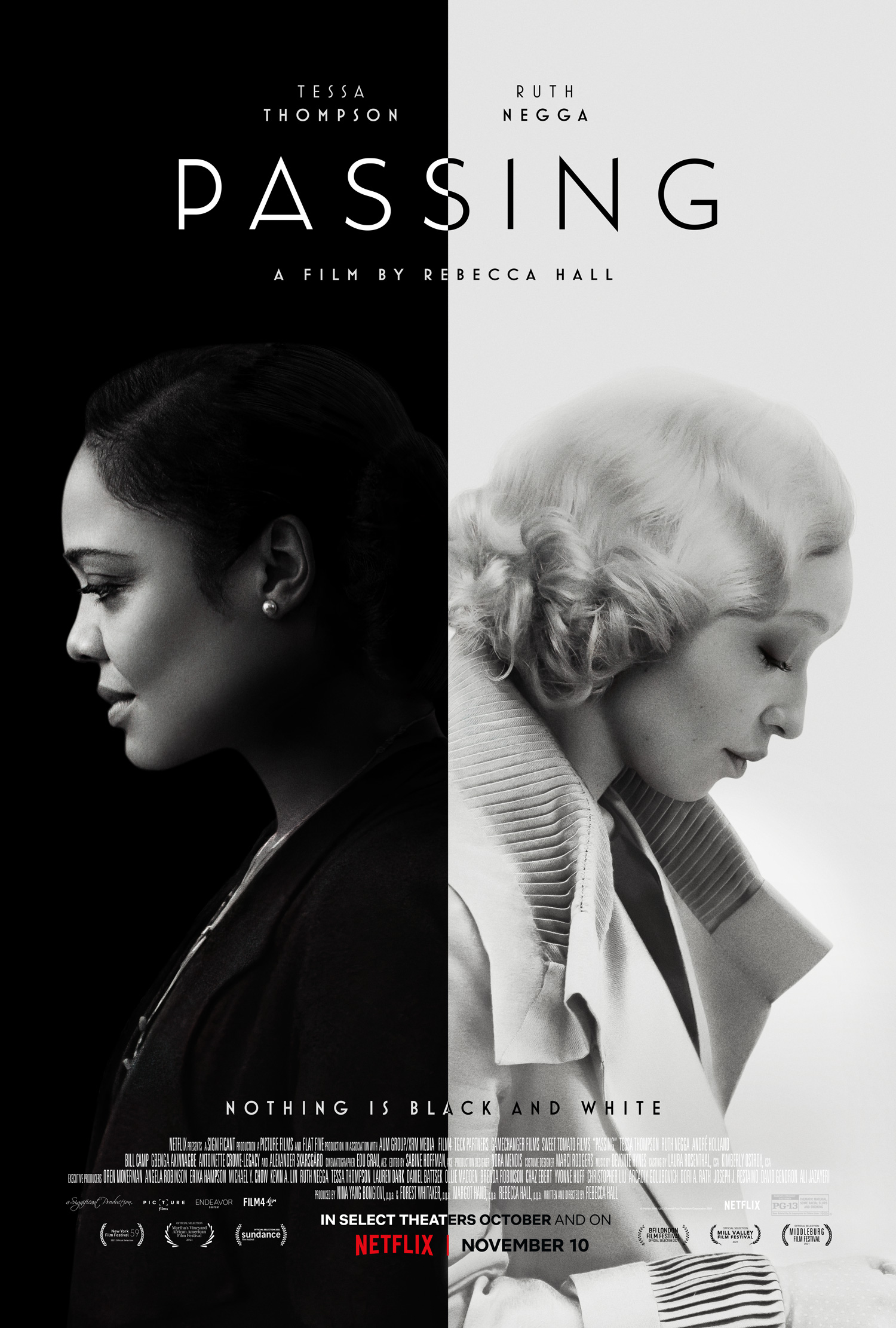
10 Nov Passing Review
PASSING
dir. Rebecca Hall, starring Tessa Thompson, Ruth Negga, and Andre Holland
Based on the 1929 novel written by Nella Larsen, the term “passing” deals with African Americans of incredibly light skin tone and their ability to maneuver through Caucasian circles as one of their own. This is the heart of the matter in the latest Netflix film Passing, written and directed by Rebecca Hall. Centered on two women who could both pass, Clare delightfully uses this to her advantage, while Irene is happy to forego any possible privileges and prefers her life amongst her people. After a chance encounter brings the old friends back into each other’s orbit, problems arise as Clare begins to burrow her way into Irene’s life, upsetting her happy home and invading her social circles in an attempt to reconnect with her African American roots. A film that unfortunately manages to resonate not just in the 1920s but in any period in American history, Passing takes a look at the phrase from multiple perspectives. Clare’s advantageous use of her skin tone is also coupled with her self loathing and purposeful blind eyes to her Caucasian husband’s mentality. Conversely, Irene’s comfort in her skin and pride at being Black holds a mirror to Clare’s insecurities and doubts.
The issue with Passing is the subtlety of the film and what’s not said: Hall decides to lean into the suggestion that Irene and Clare have had a past relationship, but refuses to outright state it. Because the suggestion is so heavily implied, however, the subtlety is completely stripped away, leaving little for the audience to infer for themselves. Likewise happens with a relationship further into the movie, which again chooses to not lay the cards on the table, but with Hall leaning forward far enough that we can get a peek at her hand. These instances lie in the middle of two great possibilities of storytelling: leaning fully into their past and acknowledging and exploring the nature of it on screen, or choosing to play things more coy, letting the audience glean their own understanding of the history between the two and the interplay between the characters. Alas, neither of these options present themselves and that limbo in between is what restricts Passing from transitioning from good to great.
Starring Tessa Thompson and Ruth Negga, Passing’s strength lies solely on these two raw and talented actresses. Irene’s restraint and inner turmoil are portrayed excellently by Thompson. Sprinkled amongst her more ostentatious roles (Thor: Ragnarok, Sorry to Bother You, Men in Black: International), Thompson balances out her career with smaller, thoughtful, nuanced characters that remind us that she’s every bit as talented as we suspect. Here, Thompson is the clear star of the movie, in almost every frame as Irene comes to grips with Clare’s role in society and how her presence has managed to affect her home life.
Ruth Negga’s Clare has the equally important task of upsetting Irene’s happy life as a light skinned African American female masquerading as Caucasian. While the majority of Thompson’s work is externalized, her frustrations and suspicions clearer on her face as the film progresses, Clare’s emotions are more internalized, with Negga relying heavily on subtext. An excellent foil for Irene, Clare’s desire to rejoin her society is played brilliantly by Negga, leaving audiences wondering just how desperate she was.
Andre Holland’s portrayal of Brian Redfield, Irene’s husband, is one of the low key more interesting pieces of the movie. His early convictions, which slowly erode over the course of the film, paint Brian in a completely different light by the end of the movie than the beginning. Brian’s own inner turmoil at the nature of race relations in the nation seem to color some of his motivations throughout the film. Unfortunately, while appearing in a respectable amount of the movie, audiences don’t get much insight into the inner workings of Brian, outside of a love for his family and his frustration of the nation. Still, Holland does an outstanding job with the screen time he’s given, even in the background of scenes when he’s not the focus.
Adapted for the screen and directed by Rebecca Hall, her first feature film, Passing demonstrates that, for now, Hall’s talents lie more in writing than directing. The decision of shooting a film dealing with the topic of relations between African Americans and Caucasian in black and white seems a ridiculously on the nose concept, a stylistic choice that comes from an inexperienced filmmaker. Hall’s choices of shot composition are at times odd as well; early in the film, an overexposed lens covering a stark white background distracts from the focal points of the scenes, drawing attention away from Thompson and Negga. Once the film settles into itself, the camera is more clear and confident, with Hall placing the audience in intimate moments we may not want to be privy to. Long since a staple of period piece films, the production design, as well as the hair and makeup, are impressive. The screen reeks of the early 1900s in every frame, from Irene and Clares’ well tailored outfits to the look of the clubs the trio find themselves in. Aided by a dreamily melancholic score from composer Devonte Hynes that seems at times to be more suited to a noir film, these elements help set the tone and feel of the movie and quickly grab audiences and pull them into the story.
Overall, Passing is an emotional examination of race relations in the 1920s and the ability of light skinned African Americans to move fluidly through dual societies. Featuring stellar subdued performances from both Tessa Thompson and Ruth Negga, aided by the tight 99 minute runtime, the film delivers a look back at the not-so-good ‘ol days of America and forces the audience to use a modern day sensibility to reflect on the slow progress of race relations. A decent freshmen outing from actress Rebecca Hall, Passing is sure to guarantee her any pick of projects in the future. A much needed win for Netflix, who’s ambitious slate has been filled with lackluster projects, the film is easily one of their best dramatic outings of the year. Passing is streaming on Netflix on November 10th.
Review by Darryl Mansel


No Comments